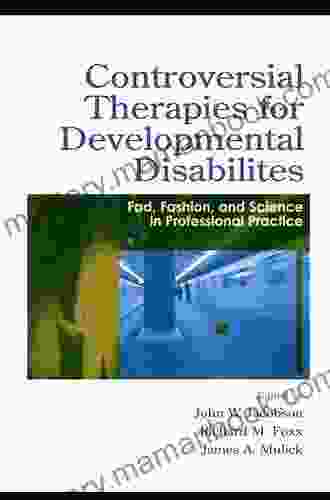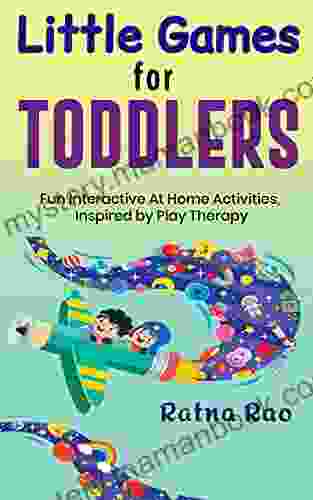Controversial Therapies for Autism and Intellectual Disabilities: A Comprehensive Examination of Efficacy and Ethical Considerations

Autism spectrum disorder (ASD) and intellectual disabilities (ID) are complex neurodevelopmental conditions that affect millions of individuals and families worldwide. While there is no known cure for these conditions, a wide range of therapies and interventions have been developed to help manage symptoms and improve quality of life.
However, some of these therapies have been the subject of controversy due to concerns about their efficacy and ethical implications. This article will examine the most common controversial therapies for ASD and ID, exploring their purported benefits, potential risks, and the ethical considerations surrounding their use.
4.8 out of 5
| Language | : | English |
| File size | : | 3819 KB |
| Text-to-Speech | : | Enabled |
| Enhanced typesetting | : | Enabled |
| Word Wise | : | Enabled |
| Print length | : | 588 pages |
Sensory Therapies
Sensory therapies aim to improve sensory processing difficulties, which are common in individuals with ASD and ID. These therapies typically involve exposing the individual to controlled sensory stimuli, such as sounds, lights, or tactile sensations.
* Sensory integration therapy: This approach aims to teach individuals how to process sensory information more effectively. It involves a variety of exercises and activities designed to improve sensory modulation, discrimination, and integration. * Auditory integration training: This therapy uses computerized sound patterns to stimulate different parts of the brain involved in auditory processing. It is claimed to improve speech, language, and social skills.
Efficacy: While some research suggests that sensory therapies may have some benefits for individuals with ASD and ID, the evidence is mixed. A 2019 review found that sensory integration therapy may improve sensory processing skills, but its effects on other outcomes are unclear. Another 2019 review found that auditory integration training had little to no effect on speech or language skills.
Ethical considerations: Sensory therapies are generally considered to be safe, but there are some concerns about the potential for overstimulation and sensory overload. It is important to note that these therapies should be conducted by trained professionals using appropriate protocols.
Behavioral Therapies
Behavioral therapies aim to change maladaptive behaviors and promote adaptive behaviors in individuals with ASD and ID. These therapies typically involve using positive reinforcement, punishment, and other techniques to shape behavior.
* Applied behavior analysis (ABA): This is one of the most widely used behavioral therapies for ASD and ID. ABA involves breaking down complex behaviors into smaller steps and rewarding desired behaviors. * Discrete trial training: This technique is used within ABA to teach specific skills or behaviors. It involves presenting a stimulus or instruction, waiting for a response, and providing a consequence (reinforcement or punishment) based on the response.
Efficacy: ABA has been shown to be effective in reducing maladaptive behaviors and improving adaptive skills in individuals with ASD and ID. However, it can be a time-intensive and expensive therapy. Discrete trial training has also been shown to be effective in teaching specific skills in individuals with ASD.
Ethical considerations: While behavioral therapies are generally considered to be safe, there are some concerns about the potential for punishment to be used in a way that is harmful or abusive. It is important to ensure that behavioral therapies are conducted by trained professionals using ethical practices.
Dietary Interventions
Some parents and practitioners have claimed that certain dietary interventions can improve symptoms of ASD and ID. These interventions include:
* Gluten-free/casein-free diet: This diet eliminates gluten and casein from the diet, which are proteins found in wheat and dairy products, respectively. It is claimed that these proteins can trigger inflammation and worsen symptoms of ASD and ID. * Ketogenic diet: This is a high-fat, low-carbohydrate diet that has been shown to be effective in reducing seizures in individuals with epilepsy. It is claimed that the ketogenic diet can also improve symptoms of ASD and ID.
Efficacy: There is little scientific evidence to support the use of gluten-free/casein-free or ketogenic diets as effective treatments for ASD or ID. A 2019 review found that there was no clear evidence that gluten-free/casein-free diets improved symptoms of ASD. Another 2019 review found that the ketogenic diet may improve seizures in individuals with epilepsy, but its effects on symptoms of ASD are unclear.
Ethical considerations: There are some concerns about the potential for nutritional deficiencies with restrictive diets such as the gluten-free/casein-free diet and the ketogenic diet. It is important to consult with a healthcare professional before starting any dietary intervention for an individual with ASD or ID.
Alternative Therapies
A variety of alternative therapies have been proposed for the treatment of ASD and ID, including:
* Hyperbaric oxygen therapy: This therapy involves breathing pure oxygen in a pressurized chamber. It is claimed that hyperbaric oxygen therapy can improve brain function and reduce inflammation in individuals with ASD. * Chelation therapy: This therapy uses chelating agents to remove heavy metals from the body. It is claimed that chelation therapy can improve symptoms of ASD and ID by reducing the toxic effects of heavy metals.
Efficacy: There is no scientific evidence to support the use of hyperbaric oxygen therapy or chelation therapy for the treatment of ASD or ID. Both of these therapies have been shown to be ineffective or even harmful in clinical trials.
Ethical considerations: Hyperbaric oxygen therapy and chelation therapy can be invasive and expensive, and they pose serious risks to health. It is unethical to subject individuals with ASD or ID to these therapies without clear evidence of their efficacy.
Ethical Considerations
The use of controversial therapies for ASD and ID raises a number of ethical concerns, including:
* Informed consent: Individuals with ASD and ID may have difficulty understanding the risks and benefits of proposed therapies. It is essential to ensure that they have adequate information and support to make informed decisions about their treatment. * Vulnerability: Individuals with ASD and ID may be particularly vulnerable to exploitation and abuse. It is important to protect them from therapies that are not supported by scientific evidence or that may cause harm. * Stigma: The use of controversial therapies for ASD and ID can contribute to the stigma associated with these conditions. It is important to promote evidence-based treatments and to challenge the myth that ASD and ID can be "cured" or "treated" with unproven therapies.
The search for effective and ethical treatments for ASD and ID is an ongoing process. While there is no known cure for these conditions, a range of therapies and interventions can help to manage symptoms and improve quality of life.
It is important to be aware of the potential benefits and risks of different therapies, and to make informed decisions about their use. Parents and caregivers should consult with healthcare professionals and other experts to determine the most appropriate treatment plan for each individual.
It is also important to advocate for ethical practices in the treatment of ASD and ID. Individuals with these conditions deserve to have access to evidence-based treatments and to be protected from therapies that pose risks to their health or well-being.
By continuing to research and develop effective and ethical treatments and by promoting informed decision-making, we can help to ensure that individuals with ASD and ID have the best possible opportunities to live full and meaningful lives.
4.8 out of 5
| Language | : | English |
| File size | : | 3819 KB |
| Text-to-Speech | : | Enabled |
| Enhanced typesetting | : | Enabled |
| Word Wise | : | Enabled |
| Print length | : | 588 pages |
Do you want to contribute by writing guest posts on this blog?
Please contact us and send us a resume of previous articles that you have written.
 Top Book
Top Book Novel
Novel Fiction
Fiction Nonfiction
Nonfiction Literature
Literature Paperback
Paperback Hardcover
Hardcover E-book
E-book Audiobook
Audiobook Bestseller
Bestseller Classic
Classic Mystery
Mystery Thriller
Thriller Romance
Romance Fantasy
Fantasy Science Fiction
Science Fiction Biography
Biography Memoir
Memoir Autobiography
Autobiography Poetry
Poetry Drama
Drama Historical Fiction
Historical Fiction Self-help
Self-help Young Adult
Young Adult Childrens Books
Childrens Books Graphic Novel
Graphic Novel Anthology
Anthology Series
Series Encyclopedia
Encyclopedia Reference
Reference Guidebook
Guidebook Textbook
Textbook Workbook
Workbook Journal
Journal Diary
Diary Manuscript
Manuscript Folio
Folio Pulp Fiction
Pulp Fiction Short Stories
Short Stories Fairy Tales
Fairy Tales Fables
Fables Mythology
Mythology Philosophy
Philosophy Religion
Religion Spirituality
Spirituality Essays
Essays Critique
Critique Commentary
Commentary Glossary
Glossary Bibliography
Bibliography Index
Index Table of Contents
Table of Contents Preface
Preface Introduction
Introduction Foreword
Foreword Afterword
Afterword Appendices
Appendices Annotations
Annotations Footnotes
Footnotes Epilogue
Epilogue Prologue
Prologue Ian St Martin
Ian St Martin Mabel Katz
Mabel Katz Anthony J Nocella Ii
Anthony J Nocella Ii Harold Kerzner
Harold Kerzner Dale W Lick
Dale W Lick Magdalena Ball
Magdalena Ball Rebecca Miller
Rebecca Miller Lucy A Snyder
Lucy A Snyder Anthony Smith
Anthony Smith Mark Harrison
Mark Harrison Nina Harkness
Nina Harkness P T Deutermann
P T Deutermann George Ellison
George Ellison Robert Mckee
Robert Mckee Weldon Burge
Weldon Burge Marsha Carr
Marsha Carr H D F Kitto
H D F Kitto Dawn Pruchniak
Dawn Pruchniak Steven Rabb
Steven Rabb Joseph Roosevans
Joseph Roosevans
Light bulbAdvertise smarter! Our strategic ad space ensures maximum exposure. Reserve your spot today!
 Terence NelsonFollow ·18.4k
Terence NelsonFollow ·18.4k Marvin HayesFollow ·7.8k
Marvin HayesFollow ·7.8k Art MitchellFollow ·6k
Art MitchellFollow ·6k Harvey HughesFollow ·8.5k
Harvey HughesFollow ·8.5k Seth HayesFollow ·12.5k
Seth HayesFollow ·12.5k Harrison BlairFollow ·18.9k
Harrison BlairFollow ·18.9k Jaden CoxFollow ·12.5k
Jaden CoxFollow ·12.5k Douglas FosterFollow ·10.1k
Douglas FosterFollow ·10.1k

 Luke Blair
Luke BlairWhen the Grid Goes Down: Disaster Preparations and...
In today's modern...

 Diego Blair
Diego BlairComputer Virus Guide: Everything You Need to Know to Stay...
Computer viruses...

 Dale Mitchell
Dale MitchellThe Whiskey of Our Discontent: A Literary Exploration of...
John Steinbeck's The...

 Mark Mitchell
Mark MitchellA Culinary Odyssey: Exploring the Delectable World of...
An to Southern...
4.8 out of 5
| Language | : | English |
| File size | : | 3819 KB |
| Text-to-Speech | : | Enabled |
| Enhanced typesetting | : | Enabled |
| Word Wise | : | Enabled |
| Print length | : | 588 pages |
















